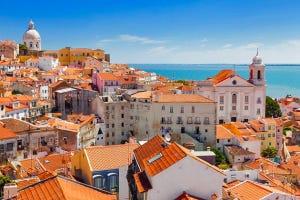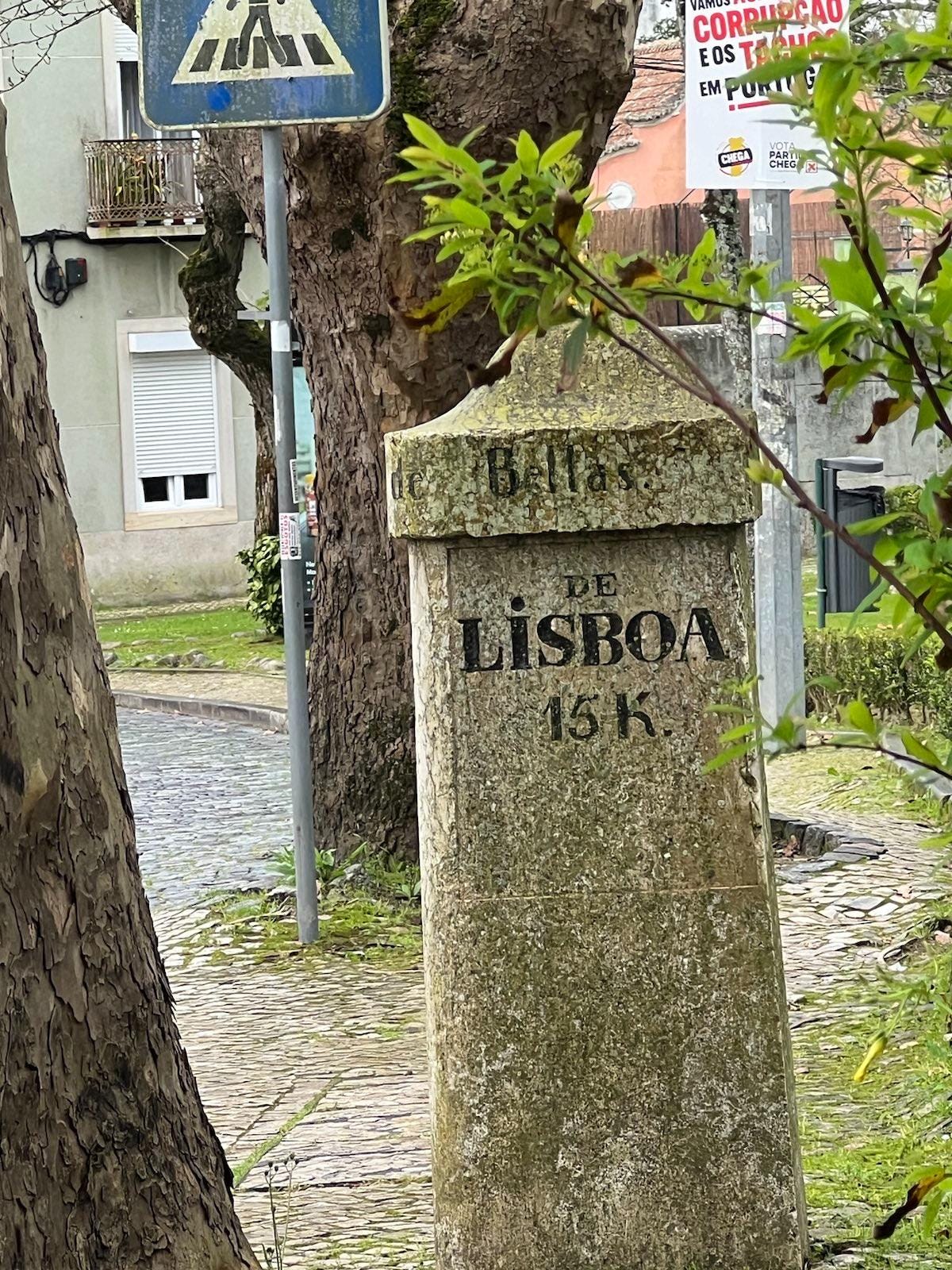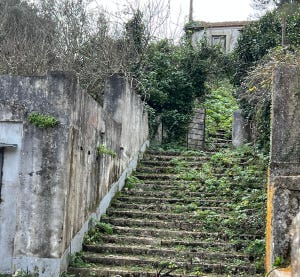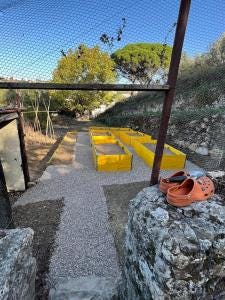Recently I watched a documentary series that focused on people living more than 100 years. None of them were feeble, and they shared many of the same qualities, among them being quite spry and active, with an undeniable joie de vie. Why were they living so long, in such good health, no sign of the dementia that haunts the American aging process (my father died of it, as did my brother-in-law’s mom; my husband’s ex-wife’s mother will too)?
The answer wasn’t that complicated. The centenarians all ate Mediterranean diets rich in vegetables, fruits and purple sweet potatoes. They ate whole, non-processed foods. They did not drink sugared beverages. They cooked long-held family recipes. They moved a lot – all walked uphill and downhill daily, and all were gardeners. They had community, which they gathered with regularly.
Longevity wasn’t on my mind when I made the move to Portugal. Like anyone, I hope I live a long and healthy life, but also realize that is not owed me. I control what I can in terms of diet and exercise, and focus on trying to ensure that I live what time I have left fully and intentionally, doing the things I feel I am meant to do.
Longevity wasn’t on my mind, but stress definitely was. In the States the stressors were seemingly everywhere and I had great difficulty controlling my response, especially since many of the stressors had to do with threats to my living situation that I had no control over. Psychologist Abraham Maslow (who coined Maslow’s Hierarchy of Needs) considered physiological needs like having a reliable place to live as the most important level of human need – all the other needs become secondary until these needs are met, for the simple reason that our lives depend on it – our bodies cannot function optimally if physiological needs are not satisfied. Having a reliable place to live, a reliable source of food and water are fundamental to health and happiness.
Never was that more evident than in the last place I lived, in San Francisco in a beautiful old period building with two units. Our landlord lived remotely, in London and Cairo. My neighbors controlled the heat to our apartment – there was one thermostat in the building, in their unit. When the cold became unbearable, our breath visible in vapory puffs when we talked, I would text them to ask politely, Could you turn up the heat please? We are wearing winter hats and coats indoors. The response would invariably be We are fine down here but I turned it up a degree! Or, We are in Palm Springs, sorry!
We shared a garage with the same neighbors, who frequently left the garage door open all night, resulting in the theft of thousand of dollars worth of motorcycle gear, power tools, ski equipment. Nothing made them more careful; when they insisted on storing furniture in the rafters above our car park spot, we knew there was no point talking to them about, so the h zip tied it all to secure it from falling. To no avail – you can’t stop careless destruction by others by taking more care, yourself. One day we woke up to a smashed side panel on our car. After years of car break-ins on the street, I had been thrilled to have a garage. Go figure. The neighbors failed to fess up, I guess hoping my husband wouldn’t notice until time had passed and thereby providing them with the cover of plausible deniability. But the husband looked the car over and detailed it regularly, so spotted the huge dent right away. He texted the neighbors, asking wtf?!
Oh yeah, they replied. We’re still trying to figure out what happened. It took three months of badgering to get the car fixed under their insurance; their efforts to delay and even duck out of it were as enraging as the original insult to the car, but as the h pointed out to me over and over, not worth being stressed about.
The landlord was another source of neverending stress. A leak in the guest bathroom toilet slowly bleached the tile floor white, the tiles coming loose underfoot. A pipe burst, transforming the kitchen floor into a hillocky terrain of buckled pergo. The front windows in the living room were installed upside down, something the landlord simply refused to correct, seeing the failure of second story windows to latch as a minor issue. When the wind blew hard I had to secure them by tying scarves to the handles of the windows and anchoring them to doors and weights. The downstairs neighbor failed to take this precaution and the wind slammed her window open, sending a sheet of glass like a guillotine onto the sidewalk below. I’ll never forget the scream and crash, looking out to see a white-faced woman standing with huge shards of scattered glass around her feet, having narrowly missed being cut to ribbons.
Rats scampered through the garden and up and down the stairs, attracted by the neighbor’s habit of scraping food into the garbage chute, which emptied into an open bin in a cubby in the garden. Even the garbage man was disgusted. I can see why you guys have rats, he told me. Tell your neighbor to stop piling unbagged food into the bin and you wouldn’t have such a problem.
Oh I never do that, the neighbor said, despite the evidence, despite the fact we could hear her banging against the chute to release chunks of food from the tines of her fork as she scraped her plates every day, the sound of metal on metal drifting upwards into our apartment like a drum.
It was becoming an expensive place to live – financially (rent raised twice during the pandemic), emotionally, and psychologically. When our youngest daughter started college on the East coast, effectively making us empty nesters (the oldest girl already ensconced in New York, married with a baby on the way) we began to seriously question why we were grinning and bearing with so much stress. Realizing we did not see ourselves long term in our living situation, we decided it was time for a change. We were already in the process of leaving California, acquiring a small piece of land near family in Alaska. With one foot planted outside our beloved California, it was easy to start thinking where the other foot should go.
It hadn’t occurred to me that place might be outside the US, but my husband has lived abroad for a number of years and immediately put the option on the table. At first I thought, Italy, or maybe Oslo, places we love and have ties to. But my first visit to Lisbon, I knew it would be Portugal. Some places call to you. My impression of an Old World California has held. Like California, Portugal has a landscape both various and beautiful – upon seeing it I was immediately reminded of a line from a book (Lonesome Dove, I think) of a white man hearing an interpretation of what the indigenous peoples of the US called California: the land of many lands. This is a land of many lands – miles of beaches, fertile wine-growing valleys, forests of cork and plane trees, misty castle topped mountains, ancient villages surrounded by crumbling walls, bustling cities.
As part of our year of research I followed a number of Facebook pages created by and for people who had moved to Portugal. Some were dedicated to helping people navigate the complexities of getting a resident visa. One or two were specialty pages, the participants all Gen Xers (like me), women over 50 (also like me), looking to network with other ex-pats. And a few were dedicated to people who made the move and hated it and decided to leave.
One thing I learned following the latter – wherever you go, there you are. If you are inclined to be cranky or negative, if you are the kind of person who has a tendency to take it personally when things don’t go your your way, to get impatient when things don’t work “the way they should”, those feelings are likely only to be exacerbated when you add in the strangeness of being a stranger in a strange land… especially if you do not speak the language.
I’ve also learned it’s not enough to have good reasons to leave your home country – you need good reasons to want to be in Portugal. If you are fleeing crime, America’s obsession with guns, a divided populace where everyone is living in their own bubble, sneering by turns at Trumpers or Antifa…crossing the Atlantic will remove you from those problems, but it will also put you in the center of a new place with its own homegrown problems.
Take Portugal for example. In terms of history, it has emerged from a dictatorship only recently – the 1970s. The years under Salazar put the country in deep poverty that is still evident today. The cost of living is low for an immigrant, but many locals are finding housing increasingly unaffordable. While there is also a growing business/bougie class, there is also a growing backlash against the AirBnBization of real estate, which is not just funded by outside money but wealthier Portuguese buying and upgrading properties to turn into profitable STRs. We stayed in one ourselves, when we first started considering a move; the owner was a young architect, the place so brand new you could still smell paint drying. It was a walkup in the Alfama, a district that was once a ruin, but now is a thriving bustling neighborhood jam packed with shops and restaurants and cafes.
A local told me that if it were not for people buying and renovating for short term rental the place would still be a dangerous sh*thole; now, 90% of the real estate is owned by multi-unit real estate holders. The government is taking steps to reward landlords for eschewing the STR market and renting instead to locals for longer term leases – significant tax breaks are in play. It seems like a good plan.
Meanwhile, there are rumblings of a far-right political party gaining power; a neighbor told me there are plenty of older folks around who speak longingly of ‘the good old days’, never mind that there is a torture museum in Lisbon dedicated to revealing exactly what happened to the folks who weren’t going along with the people in power in those days. It’s not a flaw in the individuals – research shows a tendency toward authoritarianism is endemic to human nature. You can run from it in the US, only to find another flavor of it in another place. Wherever you go there you are, but also, wherever you go there other people are, too, in all their magnificent imperfection.
I was sure we’d end up in the center of Lisbon, a jewel of a city. I’m from a small midwestern town, but learned I’m a city girl at heart when I moved to San Francisco and lived in the heart of the city. I was dazzled and felt immediately comfortable. Before that, I’d always lived in the suburbs, my neighbors unknown to me, my social life predicated on work.
Then in my 40s I discovered the joy of being able to walk or bike anywhere – to get coffee, go to the movies, meet a friend for beers, meet a few thousand other people for a Friday night bike ride (See: Critical Mass). It was an eye opening experience, to find out in middle age the kind of place I really preferred to live.So maybe not such a surprise that twenty years later I was looking at apartments and houses all over Lisbon and Cascais (a seaside expat haven). Both are nice, but when we visited the climes of Sintra, so identical to my cool, misty beloved Northern California, I felt most at home. When we found a long-abandoned fazenda between Lisbon and Sintra, we knew we’d found the perfect place.
We are coming up on a year since we closed last February. To the casual passers-by perhaps there have not been that many changes – just the removal of ivy and brambles that draped all the trees and walls. The significant changes thus far are occurring inside the buildings, which have had to be mostly gutted, some of them lacking walls and roofs, and all of them filled with incredible amounts of decades-old junk. It’s been a long time since I have not gone to bed physically tired.
The most visible change is the garden – we tilled half of it and installed raised beds – the other half is still wild, awaiting spring to be tilled and a green house installed. I had not expected to be gardening so quickly, but of course when we bought the place we were unaware of the great blessing of our neighbor Alberto, whose massive garden just across the street grows everything you can think of, as well as many things I’ve never seen or heard of including three types of passion fruit.
Thanks to Alberto’s interest and friendly pressure – not a week goes by that he doesn’t bring us cuttings, seeds and plants – we have a fairly robust starter garden. Today I harvested the first spinach and we ate it for dinner with the radishes we also harvested and pickled. The carrots and broccoli are coming along nicely, and the lettuce is almost ready. We also discovered some cabbage those dang chickens missed – one small advantage to not weeding frequently is four cabbage plants staying hidden long enough to escape the beaks of the chickens and thrive. The onions and garlic are also thriving as the chickens have no interest.
This is how we pass our days – gardening, gutting, cleaning, fixing, installing …and of course taking care of the flock of feral chickens we inherited with the property. In the evening, when the US workday starts, I sit down to my language lessons, my internet job and my writing. Then, if we’re not too tired from the day’s labors, we might watch something on our computer. We have been without a TV for a year now, though we listen to the radio regularly, both US and Portuguese stations. It’s a good life, even at this primitive stage…but I’m not sure I’d encourage anyone else to do it without understanding what they want from the experience. If you think you can come here and get by without learning the language, you probably can – but you will not feel a part of things, you’ll remain an outsider looking in. If you want people to make an investment in knowing you, you have to make an investment in being knowable to them. Shared language is central to that.
A lower cost of living is probably not a good reason to make the move, or at least shouldn’t be the only reason. Not paying so much for your housing and food only feels like a win if you can be happy doing it. There will be times and circumstances where it feels harder to be happy – the winter can be cold and damp, the rainy season depressing, the reluctance of people who don’t speak English to interact with you can feel like unfriendliness. When this happens, having a cheap breakfast at a cafe where you are the only one sitting alone, returning to a humid apartment apartment where maybe the landlord isn’t as responsive as you like about the plumbing problem or the mold on the ceiling, spending day after day trying to call the immigration service or other government services where the folks on the other end may or may not answer the phone and when they do, may or may not speak English – you have to be able to choose not to be stressed about these situations. You have to be honest with yourself about how you respond to stress.
In our first ten days here our house was broken into, and we were robbed of nearly everything of value we had brought. To add to the trauma, I actually heard the thief. Back then I was constantly waking up in the night, spooked by all the unfamiliar creakings and rustlings of a house with no electricity, pitch black in the night, that had not been occupied except by rodents for three decades.
I hear something, I whispered to my husband, and we listened. I don’t hear anything, he whispered back. It sounds like someone walking around, I said, which we discovered in the morning was exactly accurate, the shutters that covered the broken front door windows standing wide open. I called the police and found I was unable to communicate – my Portuguese was too rudimentary, the officer on the other end of the line spoke no English and after a few efforts to tell me what to do, hung up. We were lucky to know a bilingual neighbor who made the call for us; one of the three officers that responded spoke English and we were treated respectfully, but it was a trying experience. Here we were in an emergency, unable to communicate very well. I think only then did I realize what I’d really gotten myself into.
The situation had a reasonably happy ending – we had AirTags in the stolen backpack, plus the FindMy app on the electronics, and police were responsive when we told them we had a GPS signal for our things. The thief was located rather quickly, before he had time to properly wake up and get rid of his stolen goods. The police were very familiar with him, as were his neighbors, and the pressure we brought on him resulted in a quick return of almost all the stolen items. Now we can laugh at the whole situation, but back then I felt quite beleaguered. And I was puzzled why neighbors seemed so calm about it, not seeming to feel the gut fear that I was experiencing over the incident was warranted. Oh that house has been empty so long, he probably had no idea you guys were actually IN it when he went through a broken window, one said. Might be a marijuana smoker, said another. You need video cameras, said another.
In the US, if a man breaks into your home it is just assumed it is a situation that could easily end in violence. Or maybe that’s just the American in me talking – after all, in the week we were robbed, there were several highly publicized ‘stand your ground’ murders in the US. Not thieves, just people walking up to the wrong front door and meeting the muzzle of a gun. In Portugal, violence is almost unheard of, which is why I suppose my neighbors were so sanguine. It didn’t occur to anyone the thief was anything more than a thief – an enraging situation yes, but absolutely not a lethal one. He’d run so fast if he’d seen your husband, said one neighbor. She was right, too. When the h tracked the thief down via GPS and began pounding on his door, neighbors reported his hasty exit out a back window.
It was an auspicious beginning to our time here, but in Portuguese style I decided not to let it stress me. I’m glad, too, because as it turns out, it was not any kind of harbinger of bad things to come – it was an isolated incident, and one that, from the follow up reports by the police officers, the thief has been made to profoundly regret. And if I’m honest, such things happen all over, even in San Francisco. Over two decades there I lived in five different neighborhoods – the Castro, Japantown, Cole Valley, the Marina and Pacific Heights/the Presidio and in each one of them I had a car broken into, damaged and stuff stolen. It probably cost me $20,000 all told, and there wasn’t a darn thing I could do about it – if you live in San Francisco and you have a car and you don’t have your car in a garage, that is what happens. You can file a police report for insurance purposes but don’t expect anyone to do anything about it. Certainly no thief ever returned what was stolen, so we count ourselves lucky in that regard.
Meanwhile we continue to integrate ourselves into life here, expecting nothing but often delighted by the lengths our new friends and acquaintances go to to make us feel welcome. From our gardener bringing his children over for trick or treat on Halloween, a neighbor bringing a huge sack of Christmas pastries in the week our daughter visited, another neighbor gifting us home-made sweet wine and a bag of walnuts, we’ve had far more good experiences than bad. This weekend yet another neighbor has asked to come over and tour our property, and wants us to tour their newly renovated home as well. We’ll plant the plum trees Alberto has given us, and he will install a door that he has fabricated for the chicken coop.
The winter rains seem to be over, and the air is warm and springy. Soon we will move into the renovated guest house, and begin the plumbing renovations at the palaceta (which I have nicknamed Brokedown Palace) where we have spent almost a year – including a boiling hot summer and a freezing wet winter – sleeping on a mattress pad in a tent on the bare wood floor in a room with broken windows. We are busy; we are happy. To paraphrase TS Eliot, all is well, and all shall be well, and all manner of things shall be well – mostly because we’ve decided it shall be so.












What a marvelous choice, full of bravery, hope and joy.
Thank you for this! I am so happy to read about your new life experiences.